The third of our Voices webinars focuses on the rights of nature, indigenous people and mining. But there’s lots of news from the region and of LAB’s activities and plans.
Voices of Latin America Webinar 3
The Rights of Nature and Indigenous Peoples
Saturday 8 May, 15:00-16:30.
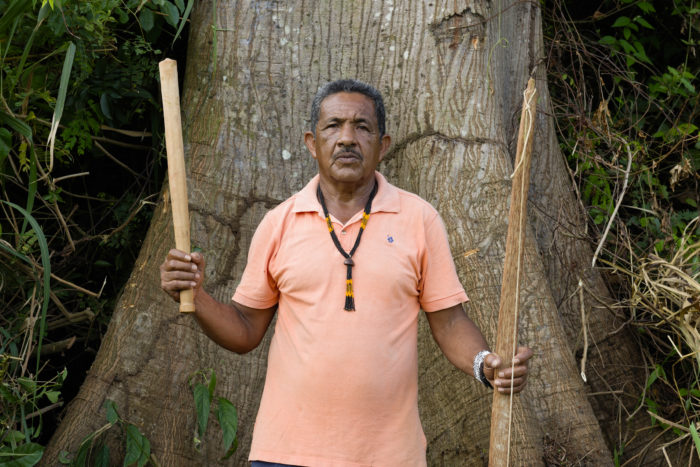
Tom Gatehouse & Marilene Cardoso Ribeiro will introduce the themes and voices for the webinar. Speakers include:
- Dário Kopenawa Yanomami, indigenous rights activist from the Yanomami people in Brazil
- Aronor (Leondardo Batista), pictured left, who was resettled as a result of the Belo Monte dam in Pará, Brazil
- Marcos Brito Uriana, from the Wayúu community in Colombia
More details here. Admission to the event is £3.00. Book your tickets here.
LAB rewards paid subscribers.
If you are reading this, you are one of the 1,342 people who receive our free monthly newsletter, which we have been sending out at least since 2012, and probably before then. In order for us to keep this newsletter free for all, we’re inviting those who can to become paid subscribers via our new Patreon scheme.
The Patreon subscription scheme: For just £3.50 a month you will receive, in addition to the newsletter, two free LAB e-books per year. For £8.50 per month you will become a Friend of LAB and receive a LAB paperback per year plus a personal acknowledgement printed in every new LAB book. Both types of paid subscriber will receive LAB’s Voz Quarterly Dispatch, each with a long-read article by a special correspondent. We hope in future to provide further benefits.
Please, if you possibly can, sign up here to become a paid LAB subscriber or Friend of LAB.
News from the region
Brazil
Those of us hoping that the end of the Trump administration would bring new US policy towards Brazil received a sharp shock when it seemed that Biden, at his World Earth Day summit on 22 April, would announce substantial grants towards the Bolsonaro government in exchange for ‘guarantees’ about protection of the Amazon. In the event, and following desperate lobbying from NGOs and other governments who were clear that Bolsonaro could not be trusted, no agreement was reached. Meanwhile, Sue Branford and Mauricio Torres have documented the systematic campaign against science practiced by Bolsonaro and his supporters.
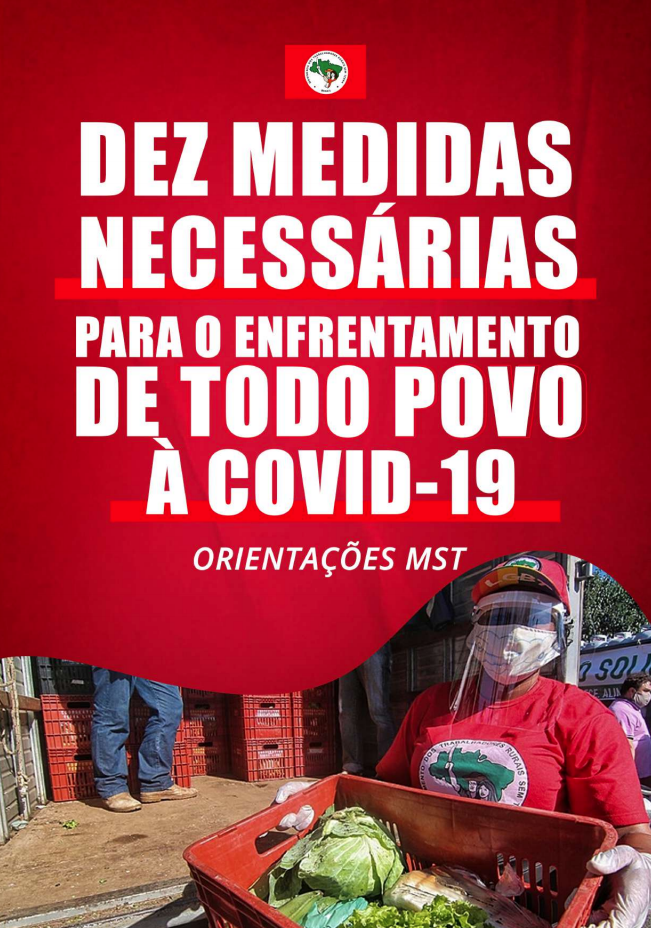
As the coronavirus pandemic rages out of control, Alistair Clark explains how Brazil’s Landless People’s Movement, the MST, has called for a ‘Parada [shutdown] for Life’, imposing their own community protection measures where Brazil’s government is doing nothing.
From Marabá, Pará, Dan Baron sent us a video of the Rios de Encontro young people’s arts collective performing a ‘collective act of creativity’ in memory of the 19 landless farmers killed on 17 April 1996 at the massacre of Eldorado dos Carajás.
Dominican Republic/Haiti
Trump-like policies appear to live on in the Dominican Republic, where president Luis Abinader announced the building of a high-tech border wall to keep out Haitian migrants. Jessica Pandian has talked to local campaigners who explain the damage this will do to local communities as well as migrants.
Women resisting violence
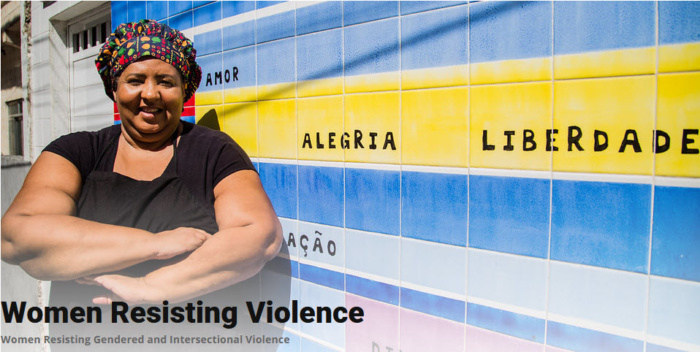
LAB’s partnership with Kings College London has already yielded an impressive new website (a sub-section of LAB’s website) with a string of new posts. Fernanda Alvarez-Piñeiro examines how rates of femicide and impunity have escalated during the Covid pandemic. One example is the brutal killing by police of Salvadorean migrant Victoria Salazar on 21 March, as Tallulah Lines reports. Throughout Latin America, writes Stephanie Wallace, there has been a ‘shadow-pandemic’ of domestic violence. Mexican art collective Las Iluministas and UK online Pink-Collar Gallery have joined forces to tell the real stories of women whose lives have been taken by femicide. In Mexico, feminists sat-in for 94 days at the Quintana Roo state legislature to demand a vote on the legalisation of abortion. Although the vote was lost, the fact that it was held at all was a significant achievement that heartened campaigners.
Mining
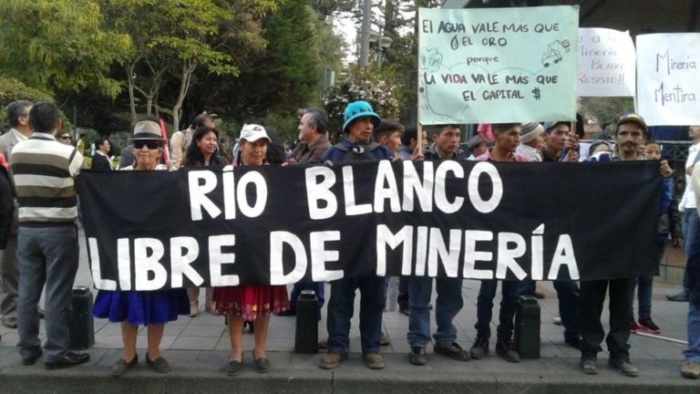
LAB partner London Mining Network joined Brazil Matters and Survival International to stage an impressive webinar on 29 April, with almost 100 participants. The theme was ‘Indigenous Emergency – The Fight for Life in Brazil’ and resistance to garimpo and large-scale mining featured prominently. You can watch the video here.
In Ecuador, as Kinga Harasim and Tom Gatehouse relate, residents of Cuenca, in Azuay province, voted overwhelmingly in a ‘consulta popular’ to ban mining that would affect key water resources.
Research and writing is continuing for LAB’s The Heart of Our Earth – Community Resistance to Mining in Latin America. The website is live already, and the book by Tom Gatehouse will be published in mid-2022.
LAB News
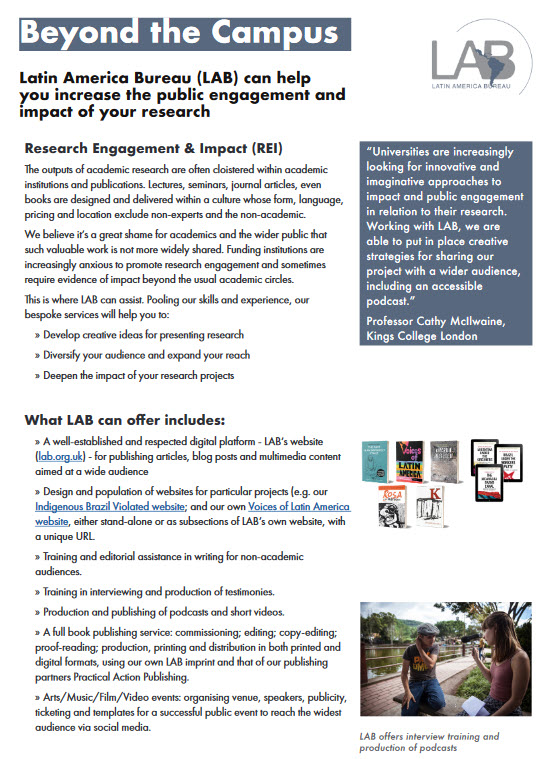
REI: LAB’s new Research Engagement and Impact (REI) strand of work is growing, offering chances for academic researchers to extend their reach ‘Beyond the Campus’. Current projects include Indigenous Brazil Violated, with Cardiff University, and Women Resisting Violence with Kings College, London.
Voices: LAB’s Voices of Latin America received a rave review in US journal Science and Society, where the book is distributed by Monthly Review Press. Meanwhile the third of our webinars, organised by Emily Gregg on the Rights of Nature and Indigenous Peoples will be held on Saturday 8 May. The final webinar, a Celebration of Cultural Resistance, will now take place in September.
Mexico Inside Out: LAB’s second Inside Out, in depth country guide, by Nick Caistor, was launched at the Calling Mexico online festival on 17 April. You can purchase a copy here.
Reviews
This month’s book and film reviews include:
- Chilean film Animales Extintos about toxic masculinity in schools
- Chilean film La Mirada Incendiada about dictatorship violence
- Colombian film Dive, Terra Bomba, Dive about community initiatives to protect Bocachica’s Varadero Reef
- Argentinian film Un Crimen Común, which follows a middle class academic mother whose life unravels after she becomes implicated in the death of her housekeeper’s son.
- Salvadorean film Imperdonable, about the hyper-macho world of gangs and their links to evangelical churches.
